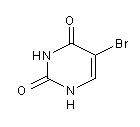
Structural formula
| Business number | 014K |
|---|---|
| Molecular formula | C4H3BrN2O2 |
| Molecular weight | 190.99 |
| label |
5-Bromo-2,4(1H,3H)pyrimidinedione, 5-bromouracil, 5-bromoouracil, 5-bromo-2,4-dihydroxypyrimidine, 5-bromo by snow, 5-Bromo-2,4-dihydroxypyrimidine, Uracil, 5-bromo- (VAN 8CI), 5-Bromo-2,4(1H,3H)-pyrimidinedione |
Numbering system
CAS number:51-20-7
MDL number:MFCD00006017
EINECS number:200-084-0
RTECS number:YQ9060000
BRN number:127176
PubChem number:24851231
Physical property data
1. Properties: White crystalline powder.
2. Density (g/mL, 25/4?): Undetermined
3. Relative vapor density (g/mL, air=1): Undetermined
4. Melting point (ºC): 293
5. Boiling point (ºC, normal pressure): Undetermined
6. Boiling point (ºC, 5.2kPa): Undetermined
7. Refractive index: Undetermined
8. Flash point (ºC): Undetermined
9. Specific rotation (º): Undetermined
10. Autoignition point or ignition temperature (ºC): Undetermined
11. Vapor pressure (kPa, 25ºC): Undetermined
12. Saturated vapor Pressure (kPa, 60ºC): Undetermined
13. Heat of combustion (KJ/mol): Undetermined
14. Critical temperature (ºC): Undetermined
15. Critical pressure (KPa): Undetermined
16. Log value of oil-water (octanol/water) partition coefficient: Undetermined
17. Explosion upper limit (%, V/V): Undetermined
18. Lower explosion limit (%, V/V): Undetermined
19. Solubility: Slightly soluble in water.
Toxicological data
1. Acute toxicity: rat abdominal LD50: 1700mg/kg; mouse abdominal LD50: 1400ma/kg; 2. Other multi-dose toxicity: dog oral TDLo: 5mg/kg/2W-I3, mutagenicity: mutation microorganismsTEST system : Bacteria – Salmonella typhimurium: 300mg/L mutated microorganismsTEST system: Bacteria – Escherichia coli: 10mg/L; DNA inhibitionTEST system: bacteria – Bacillus subtilis: 25mg/L; mutated microorganismsTEST system: bacteria – Klebsiella pneumoniae : 1mg/L; Mutated microorganismsTEST System: Microorganisms – not otherwise specified: 50mgL; Loss and non-disjunction of sex chromosomes: 1mg/L; Cytogenetic analysis: 10mg
Ecological data
None
Molecular structure data
1. Molar refractive index: 32.78
2. Molar volume (cm3/mol): 97.1
3. Isotonic specific volume (90.2K ): 264.1
4. Surface tension (dyne/cm): 54.6
5. Polarizability (10-24cm3): 12.99
Compute chemical data
1. Reference value for hydrophobic parameter calculation (XlogP): None
2. Number of hydrogen bond donors: 2
3. Number of hydrogen bond acceptors: 2
4. Number of rotatable chemical bonds: 0
5. Number of tautomers: 9
6. Topological molecule polar surface area 58.2
7. Number of heavy atoms: 9
8. Surface charge: 0
9. Complexity: 199
10. Number of isotope atoms: 0
11. Determine the number of atomic stereocenters: 0
12. Uncertain number of atomic stereocenters: 0
13. Determine the number of chemical bond stereocenters: 0
14. Number of uncertain chemical bond stereocenters: 0
15. Number of covalent bond units: 1
Properties and stability
None
Storage method
This product should be kept sealed.
Synthesis method
Suspend L-alanine in a dioxane solution, perform an acylation reaction with tert-butoxycarbonyl azide to obtain a crude product, and then refine it by recrystallization.
Purpose
Used as a mutagen.
extended-reading:https://www.bdmaee.net/dimethyltin-dichloride/extended-reading:https://www.morpholine.org/nn-dicyclohexylmethylamine/extended-reading:https://www.newtopchem.com/archives/39962extended-reading:https://www.newtopchem.com/archives/39832extended-reading:https://www.cyclohexylamine.net/thermal-catalyst-sa102-polyurethane-thermal-catalyst-sa-102/extended-reading:https://www.bdmaee.net/wp-content/uploads/2020/06/68.jpgextended-reading:https://www.bdmaee.net/dabco-eg-33-triethylenediamine-in-eg-solution-pc-cat-td-33eg/extended-reading:https://www.cyclohexylamine.net/pc-cat-np109-low-odor-tertiary-amine-catalyst-polycat-9/extended-reading:https://www.bdmaee.net/u-cat-sa838a-catalyst-cas12674-17-3-sanyo-japan/extended-reading:https://www.bdmaee.net/dabco-2039-catalyst-2039-dabco-2039-catalyst/

